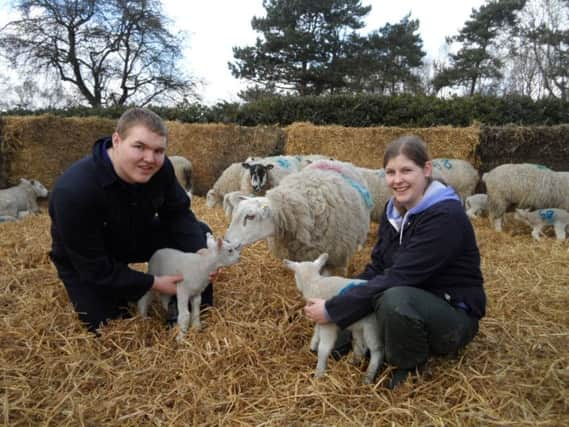It’s lambing time at the college farm that means business


“This is our shop window where we not only hopefully inspire future generations to come into farming but also encourage people to find out more about where their food is coming from. The majority of those who come on Sunday will be children under the age of eight brought along by either their parents or grandparents and this is where we start sowing the seeds that will bring them back to study here in later years.
“Reports from Defra and other farming bodies suggest that there are 60,000 jobs required in the industry and of our nearly 200 agricultural students here at present 98 per cent of them will find jobs in farming once they leave here. It’s quite a success rate.”
Advertisement
Hide AdAdvertisement
Hide AdThere are sometimes misconceptions about college farms and how different they are to a family concern. John sets the record straight.
“Someone from outside of the college asked me the other day what we do with all the lambs that are born here. The person concerned asked whether we give them away or put them down. This is a real working farm and it has to be profitable. Our lambs go to market at around 40 kilos in York or Selby and go to the highest bidder in the same way as any normal farm’s stock. We’re a commercial concern and things have to pay their way whilst also give the students an opportunity to learn first hand about farming.
“We do have quite a few constraints because we are a college but the upside is that we also have 200 students we can call upon to get all the jobs done if we need to, that’s something that a regular farmer doesn’t have available. That can sound like a heavenly situation to be in and sometimes it is.
“Our current flock runs to 250 breeding ewes of which half are Mules and half white-faced predominantly Texel X. That gives our students an appreciation of both hill and lowland sheep.
Advertisement
Hide AdAdvertisement
Hide Ad“We also have a small pedigree Beltex flock of half a dozen ewes that we are enjoying both for their excellent meat ratio and because we enjoy taking them to the Great Yorkshire Show and bringing back some red tickets.
“We manage the flock the way any other farmer would by ensuring we have replacements and we buy-in 25-30 Mules a year from either Skipton livestock market or further afield. We also bring in guest rams to see how other breeds will work such as the Suffolk. We are very much about producing butchers lambs.”
Of course arranging an event like Lambing Sunday can be a bit of a misnomer if all of the lambs have already been born by the time tomorrow comes, and things have been going well this week. There’s also no absolute guarantee that new lambs will be born during Sunday’s event.
“They don’t appear just because we invite the public to come and take a look but there will be lots of lambs to see as we’ve made a good start and we’re very pleased with our lambing percentages as we are coming in at well over 170 per cent. What we don’t want are too many triplets. I recall what an old colleague here once told me about them. He said: ‘They are only any good lad if you have wives and daughters who want ‘summat’ to do feeding pet lambs’.”
Advertisement
Hide AdAdvertisement
Hide AdOver the past decade the farming operation run by farm manager Mike Patch at Askham Bryan College has grown immensely. The original Westfield Farm at the college itself runs to 500 acres; ten years ago they took on the farm management of Headley Hall near Tadcaster, the University of Leeds farm, that runs to a further 525 acres; and very recently Home Farm at nearby Askham Richard was added when the Askham Richard Estate came up for sale, adding another 350 acres.
“We have a 250-cow dairy herd producing a herd average of around 8,500 litres per cow per year. Our milk goes to Arla’s Stourton-based dairy in Leeds. Bull calves are sold to a local beef producer and we keep all of our heifer calves as we replace 20-25 per cent of the herd each year.
“Across the three farms we grow winter wheat, winter barley, spring barley, maize for the cows, grasses and oil seed rape grown on an industrial use contract. We now get a bonus for that whereas when I first started here we received the bonus for growing it for human consumption. We also let land off for growing of carrots and potatoes.”
John came to Askham Bryan College as a student in 1975 having initially left school where he lived in Pickering and having worked on a farm in Salton, near Kirkbymoorside.
Advertisement
Hide AdAdvertisement
Hide Ad“The farm where I was working was put up for sale and my farm manager Fred Wright pointed me in the direction of coming here.
“After my year studying for my National Certificate in Agriculture I was offered a job. It was meant to be for a year or 18 months if I wanted the experience and I’m still here.
“You never stop learning.”
A family friendly event
Lambing Sunday takes place tomorrow at Askham Bryan College, York, 10am- 4pm.
There will be tractor rides, a working dog display and an opportunity to see cows being milked.
Advertisement
Hide AdAdvertisement
Hide AdDeliciously Yorkshire, will provide a producer market and there will be a series of butchery demonstrations.
Admission is £5 for adults and free for under 16s. Free car parking will be available. However the event is not suitable for expectant mothers.